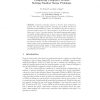Free Online Productivity Tools
i2Speak
i2Symbol
i2OCR
iTex2Img
iWeb2Print
iWeb2Shot
i2Type
iPdf2Split
iPdf2Merge
i2Bopomofo
i2Arabic
i2Style
i2Image
i2PDF
iLatex2Rtf
Sci2ools
AGI
2015
2015
Comparing Computer Models Solving Number Series Problems
Inductive reasoning requires to find for given instances a general rule. This makes inductive reasoning an excellent test-bed for artificial general intelligence (AGI). An example being part of many IQtests are number series: for a given sequence of numbers the task is to find a next “correct” successor number. Successful reasoning may require to identify regular patterns and to form a rule, an implicit underlying function that generates this number series. Number series problems can be designed along different dimensions, such as structural complexity, required mathematical background knowledge, and even insights based on a perspective switch. The aim of this paper is to give an overview of existing cognitive and computational models, their underlying algorithmic approaches and problem classes. A first empirical comparison of some of these approaches with focus on artificial neural nets and inductive programming is presented.
Related Content
| Added | 13 Apr 2016 |
| Updated | 13 Apr 2016 |
| Type | Journal |
| Year | 2015 |
| Where | AGI |
| Authors | Ute Schmid, Marco Ragni |
Comments (0)

